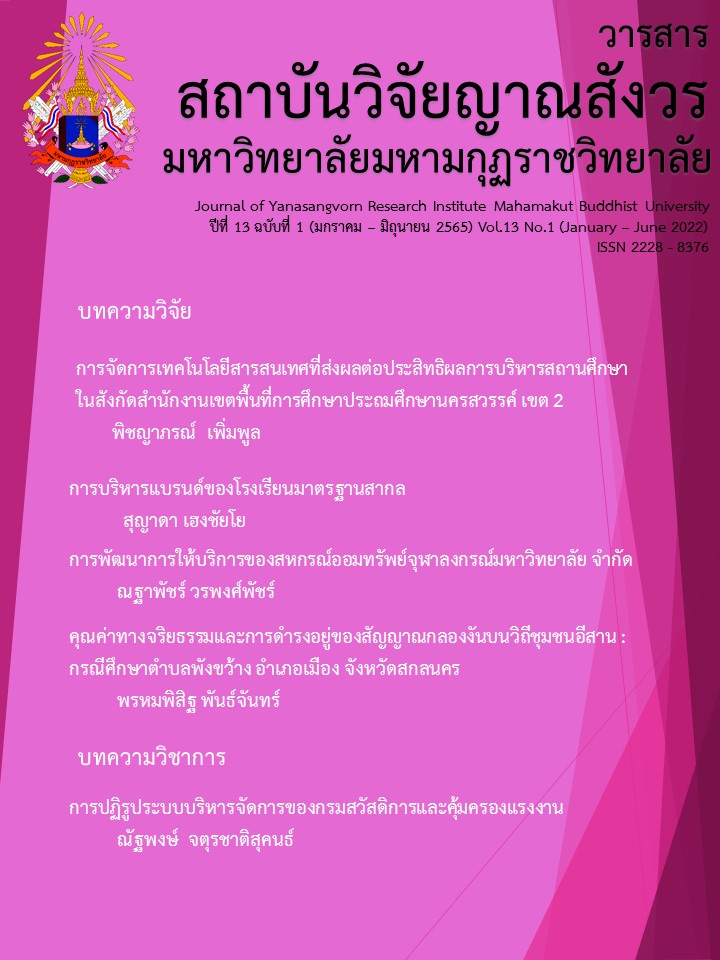THE ETHICAL VALUE AND EXISTENCE OF KLONG-NGAN’S SOUND ON I-SAN COMMUNITY WAY OF LIFE: A CASE STUDY OF PHANGKHANG SUB-DISTRICT MUANG DISTRICT SAKONNAKHORN PROVINCE
Main Article Content
Abstract
This research aimed to 1.study an importance of Klong-ngan’s sound, 2.study an ethical values of Klong-ngan’s sound, and 3. study the existence situations of Klong-ngon’s sound on I-san community way of life. This was qualitative research on Participatory Action Research (PAR). The target group was people in Phangkhang sub-district, Muang district, Sakonnakhorn province, divided into 2 groups: 36 persons for interview and 250 persons for focus group in 27 times that selected by purposive sampling and snowball sampling. Data were collected by in-depth interview and focus group. Main research instruments were the semi structure in-depth interview and schedule for focus group, that approved by the 3 experts. Content analysis was used to perform this qualitative study.
The results of this study revealed that: 1.The importance of Klong-ngan’s sound consisted of creation of acknowledgement, morality, worthiness, good stability and paragon, good relationship and economic basic. 2.Klong-ngan’s sound could create the internal ethical value, namely the good conscious mind, and the external ethical value, namely the good behaviour or characteristic and the good community for people. And 3.The existence situations of Klong-gnan’s sound depended on a Klong-gnan beating of monks at Phangkhang sub-district, that changed a little from the past
Article Details

This work is licensed under a Creative Commons Attribution-NonCommercial-NoDerivatives 4.0 International License.
References
นิคม จำปามาส. (2514). กลองกริ่ง กลองเพล. ชาวกรุง, 20 (9-11), 38-42.
พรหมพิสิฐ พันธ์จันทร์, จรูญ รัตนกาล และประสิทธิ์ ชาระ. (2563). การสืบทอดและคุณค่าทางจริยธรรมของชาวอีสานในสัญญาณกลองเพล: กรณีศึกษาตำบลพังขว้าง อำเภอเมือง จังหวัดสกลนคร. วารสารมนุษยศาสตร์และสังคมศาสตร์ มหาวิทยาลัยนครพนม, 10 (1), 55-63.
มติชนออนไลน์. (2559). รู้จักไหม? “ตีกลองแลง” สัญญาณเตือนคนเข้าวัด – แซ่ซ้องถึงเทวดาว่าศาสนา ยังอยู่. สืบค้นจาก https://www.matichon.co.th/local/news_182297
ยศ สันตสมบัติ. (2556). มนุษย์กับวัฒนธรรม (พิมพ์ครั้งที่ 4). กรุงเทพฯ: มหาวิทยาลัยธรรมศาสตร์
วิทยา สายสุด. (2536). สื่อสัญญาณพื้นบ้านอีสานในเขตอำเภอหัวตะพาน (วิทยานิพนธ์ปริญญามหาบัณฑิต).มหาวิทยาลัยศรีนครินทรวิโรฒ, มหาสารคาม.
สุทธิวงศ์ พงศ์ไพบูลย์. (2525). วัฒนธรรมพื้นบ้าน: แนวปฏิบัติภาคใต้. กรุงเทพฯ: สถาบันทักษิณคดีศึกษา มหาวิทยาลัยศรีนครินทรวิโรฒ.
De Saussure, Ferdinand. (1959). Course in General Linguistics. New York: Philosophy Library.
White, L., 1959. The Evolution of Culture. New York: McGraw-Hill.


